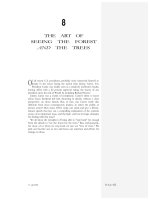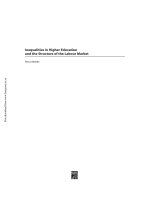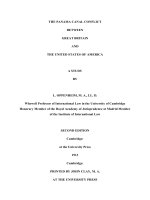doctor who and the genesis of the daleks (doctor who, no. 27)
Bạn đang xem bản rút gọn của tài liệu. Xem và tải ngay bản đầy đủ của tài liệu tại đây (1.21 MB, 137 trang )
Mysterious humans from 22nd-century Earth ‘time-jump’
back into the 20th century so as to assassinate a high-
ranking diplomat on whom the peace of the world depends.
DOCTOR WHO, Jo Grant and the Brigadier are soon called in
to investigate. Jo is accidentally transported forward to the
22nd century; the Doctor follows, eventually to be captured
by his oldest and deadliest enemy - the DALEKS! Having
submitted the Doctor to the fearful Mind Analysis Machine,
the DALEKS plan a ‘time-jump’ attack on Earth in the 20th
century!
ISBN 0 426 11260 1
DOCTOR WHO AND
THE DAY OF
THE DALEKS
Based on the BBC television serial Doctor Who and the Day of the
Daleks by Louis Marks by arrangement with the British
Broadcasting Corporation
TERRANCE DICKS
published by
The Paperback Division of
W. H. Allen & Co. Ltd
A Target Book
Published in 1974
by the Paperback Division of W. H. Allen & Co. Ltd.
A Howard & Wyndham Company
44 Hill Street, London W1X 8LB
Copyright © 1974 Terrance Dicks and Louis Marks
‘Doctor Who’ series copyright © 1974 by the British
Broadcasting Corporation
Daleks created by Terry Nation
Printed in Great Britain by
The Anchor Press Ltd, Tiptree, Essex
ISBN 0426 10380 7
This book is sold subject to the condition that it shall not, by way
of trade or otherwise, be lent, re-sold, hired out or otherwise
circulated without the publisher’s prior consent in any form of
binding or cover other than that in which it is published and
without a similar condition including this condition being
imposed on the subsequent purchaser.
CONTENTS
1 Terror in the Twenty-second Century
2 The Man who saw a Ghost
3 The Vanishing Guerilla
4 The Ghost Hunters
5 Condemned to Death!
6 Prisoner of the Daleks
7 Attack of the Ogrons
8 A Fugitive from the Future
9 Escape from the Ogrons
10 Interrogation by the Daleks
11 The Raid on Dalek Headquarters
12 Return to Danger
13 The Day of the Daleks
14 All Kinds of Futures
1
Terror in the Twenty-second Century
Map showing grounds and environs of Austerly House
A—house B—main gateway C—high boundary wall D—road E—two-
track railway line (disused) F—tunnel
Moni sat up and looked around cautiously. The enormous
dormitory was packed with sleeping forms, drugged into total
exhaustion by hours of brutal physical toil. One or two
murmured and twisted and cursed in their sleep. A man
screamed, ‘No, no, please don’t ’ and then his voice tailed off
into the mutterings of a nightmare. Moni saw that it was Soran.
He had been beaten by the guards that morning for failing to
meet his work-norm. Soran was weakening daily. He wouldn’t
last much longer.
Somehow the incident seemed to give Moni courage. It was
for Soran that he was fighting. Soran and thousands like him
who would die in the work camps from brutal beatings, or worn
out after years of grinding labour, unless unless Moni threw
back the coarse blankets and swung his feet to the floor. There
was nothing unusual in his being fully dressed. The dormitories
weren’t heated and most of his fellows slept fully clothed against
the night cold. Vaguely Moni remembered having heard of a
time when men had special clothes to sleep in—called py-
something or other. His mind could scarcely imagine such
luxury.
Moni fished his boots from beneath his pillow. He’d put
them there automatically the night before. The boots were made
of new strong plastic, and in the work camps nothing valuable
was safe unless it was within touching distance. Tucking the
boots under his arm Moni moved silently across the room
towards the door. His bare feet made no sound on the rough
concrete floor.
Once in the compound, he paused in a patch of shadow to
pull on the boots then crept silently along the edge of the outer
wall. Taking off his tunic Moni uncoiled a thin plastic rope from
round his waist. He took the crude grappling hook from his
pocket, tied it to the rope and swung the grappling hook at the
row of spikes on top of the wall. It fell short and landed back at
Moni’s feet with a metallic scrape. Moni froze in terror. He
glanced towards the doorway of the guard’s quarters. Surely
they must have heard. But there came only the rumble of
guttural inhuman speech. The compound was supposed to be
patrolled at all times, but the guards were careless and idle. On
cold nights like this they kept to their quarters, huddling round
the roaring fires in the iron braziers, stuffing down slabs of
coarse grey food that their masters provided,
Moni hurled the grapple again, and this time his luck was in.
It caught firmly on the spikes and, after testing it with a tug,
Moni climbed quickly up the rope, his tunic between his teeth.
Once on top of the wall it would make a rough pad to protect
him from the spikes. Awkwardly he bestrode the wall, pulling
the rope up beside him, and freeing the grappling hook. He
lowered the rope to the other side of the wall, dropped his tunic
after it, and then jumped down, landing with a thud that jolted
the breath out of hint. Quickly he put on his tunic, and hid rope
and grappling iron beneath it. He set off swiftly down the
endless concrete road through the rubble.
Moni had covered several miles before his luck ran out. He
was just turning the corner of one of the many ruined buildings
when an enormous hairy hand reached out from the darkness
and plucked him off his feet. The hand slammed him against the
remains of a brick wall, making him gasp out loud. Moni
flinched, as a burning brand was thrust uncomfortably close to
his face, and as his eyes became accustomed to the light he could
just begin to pick out the hulking shape of the creature that had
captured him. Nearby was a small campfire with other giant
forms huddled round it. Moni cursed his luck. He had run into
one of the roving patrols, camping out in the ruins. From the
campfire, a guttural voice said, ‘Bring!’ Moni’s captor shambled
back towards the fire, dragging Moni after him like a rag doll.
Moni let himself hang limp, making no attempt to resist. He had
no wish to be torn to pieces. Against human beings he might
have stood a chance, but these guards were not human: these
were Ogrons.
Thrown sprawling at the feet of the patrol, Moni looked up
at the hulking shapes looming over him in the firelight. Often as
he had seen them before, the Ogrons never failed to terrify him.
Creatures somewhere between gorilla and man, they stood
almost seven feet in height with bowed legs, massive chests and
long powerful arms that hung almost to the ground. Their faces
were perhaps the most awful thing about them : a distorted
version of the human face, with flat ape-like nose, small eyes
glinting with cruelty, and a massive jaw with long yellow teeth.
But the Ogrons had one quality which gave Moni a glimmer of
hope, even now: for all their savage ferocity and primitive
strength, they were very, very stupid.
Moni scrambled to his feet. Forcing himself to speak slowly
and calmly he said, ‘I am a section leader of Work Camp Three.
I am needed to replace a section leader of Work Camp Four,
who has been taken ill.’ He looked round the circle of Ogeons to
see if his story was being believed. The Ogrons looked back at
him impassively. Did they believe him? Had they even
understood what he was saying? In the same calm, flat voice
Moni said, ‘The order for my transfer came direct from your
masters. If I am delayed they will be very angry. They will be
angry with you.’
This time his words had some effect. It was almost comic to
see the looks of alarm on the brutal Ogron faces. The one thing
which could strike fear to the hearts of these terrifying creatures
was the mention of the even more fearsome beings who were
their masters.
The leading Ogron gestured into the darkness with a
massive hairy paw. ‘You go. Go quickly.’ Moni turned and ran
into the darkness.
It took him another hour of hard, dangerous travel before
he reached his destination. He crossed a patch of waste ground.
The moonlight showed weeds flourishing over the shattered
foundations of a house. Shifting the concealing rubble, Moni
found and then lifted a hidden trap-door and dropped down
into the darkness. He landed at the head of a still intact flight of
steps. Cautiously he moved down them until his eyes picked out
a little patch of light at the bottom. It was shining beneath the
edge of a closed door. Moni moved quietly to the door and
rapped out a complicated series of knocks. After a moment the
door creaked open. Boaz stoorl facing him, blaster in hand. ‘All
right Boaz, it’s me,’ said Moni.
Boaz’s voice showed the strain he was feeling. ‘You’re late
we didn’t know—’
Moni interrupted him. ‘Ran straight into an Ogron patrol.
Managed to talk my way out of it. The others here?’ Boaz
nodded, and Moni followed him into the cellar.
Anita and Shura were huddled round the charcoal fire that
blazed in a makeshift brazier. Moni glanced quickly round the
room. It was his first visit to the H.Q. of this particular cell, but
they were all much the same. In every city there were hidden
rooms like this. Places to storearms and food. Places to meet and
talk and plan. Places where men and women met with one
burning desire in common—to take back their planet from the
alien beings who had stolen it.
Patrolling Ogrons carried out an unending search for these
hideouts. Sometimes they found one : Ogron boots kicked in the
door and the little group of plotters inside were ruthlessly
destroyed. But for every cell that was wiped out, another and
still another sprang up to replace it.
Moni looked round at the three eager faces. Boaz, dark,
scowling and intense; fiercely brave, but too highly strung, too
ready to act without thinking. Shura, the youngest, full of a fiery
idealism. Finally, he looked at the girl, Anat. Slim, dark and wiry
with close-cropped hair. Anat was still beautiful, in spite of the
rough work clothes she was wearing. Here was the real leader,
Moni thought. Fierce courage, a passionate hatred of the enemy,
and the cunning and caution that made her wait until the best
moment to strike.
Anat spoke first. ‘Something’s happening, Moni. What is it?
You wouldn’t have called this meeting without good reason. We
don’t often have the honour of meeting one of the Central
Committee!’
Brisk and to the point as always, thought Moni approvingly.
He said, ‘You’re right, of course, Anat. Something has happened.
Something big, and it involves you all.’ He paused for a moment,
collecting his thoughts. ‘You know the kind of thing we’ve been
doing up till now—isolated bits of sabotage, sometimes big,
sometimes small. But pinpricks, no more than that.’
Boaz burst out: ‘Pinpricks? Is that what we’ve been fighting
and dying for? As long as we go on hitting them, at least they
know they haven’t beaten us.’
Anat put a restraining hand on his arm, ‘Let him talk, Boaz.
He knows the value of our work.’
‘You’re right, of course,’ said Moni quickly, ‘any act of
resistance is valuable in itself, but we can’t go on for ever like
this. They can’t stop us, but we can’t really hurt them. We’re all
losing sight of the big objective because we’re too concerned with
the day-to-day struggle!’
Anat said, ‘Is there an alternative?’
Moni nodded. ‘There may be—now. The scientists and
historians of the Central Committee have come up with a plan.
It’s dangerous, maybe suicidal, but it offers a chance to free the
entire planet. It calls for a special mission, carried out by just a
handful of us. I have recommended you three for the final
assault team, that is, assuming you all three volunteer.’
Anat leaned forward urgently, the glow from the fire
illuminating her thin face. ‘We volunteer. All of us. You know
that without asking. Now, tell us the plan.’
Moni paused for a moment looking round at their eager
faces. He might well be about to send them all to their deaths.
He said, ‘I can only give you a brief outline now. Like the rest of
you, I have to be back in camp before morning. But I can tell
you this much: we want to attempt to send you back through
time ’
The Controller of Earth Sector One pushed aside the remains of
an excellent meal. Appreciatively he drained the last of his
drink—real wine in a real china cup! Few men on Earth enjoyed
such luxury in these times. He repressed a twinge of unease at
the thought of those of his fellow humans who were less
fortunate, those in the work camps. They would he draining
their bowls of gruel about now, desperately licking the bowls
clean to see that not a scrap of food was wasted Before leaving
the room the Controller paused before a mirror, smoothing back
his thinning hair and adjusting the tunic on his shoulders. More
luxury, he thought. The same basic tunic as the others of course,
but cloth! Real cloth, none of your plastic! He picked up the
sheaf of reports he had been working on through dinner and
sighed. He knew how much he was envied and hated. People
didn’t realise that his rank had its duties too. The constant
unremitting work. And now he had to make his report to Them.
Something They wouldn’t care to hear, what’s more.
Bracing himself, the Controller left his private dining-room
strode along the endless corridors of Central Control. Scurrying
human slave workers made way for him deferentially. But it was
a different story when he reached the doorway leading to the
innermost H.Q. The door was flanked by Ogron guards, and as
he tried to enter, one of them shoved him away with a hairy
paw. The Controller strove to retain his dignity.
‘You know who I am. Chief Controller of this entire sector.
You will show me the respect I am entitled to.’ The Ogron
looked at him impassively, and the Controller’s shoulders
drooped in defeat. He knew that the Ogron saw him as just
another human. A slave, like all humans. He said dully, ‘You
don’t understand. I must make a most important report—to
your masters.’ Unconsciously copying the tactics of Moni the
night before, the Controller added, ‘They will be angry if you do
not let me enter.’
The Ogron grunted, ‘You—wait!’ Leaving its fellow to guard
the Controller it went inside. After a moment it returned and
said, ‘Come now.’
The Controller went through into the antechamber and
then waited. Silently a panel slid open in front of him and he
entered the inner chamber.
It was a small, completely bare room with a raised ramp at
one end. After a moment another wall-panel slid open and a
gleaming metallic creature glided through. Its eye-stalk swung
round to look at the Controller, who bowed respectfully. This,
after all, was the Black Dalek, one of the supreme rulers of the
planet Earth in the twenty-second century.
In its grating metallic voice the Black Dalek said, ‘Report’
The Controller tried to restrain the quaver of terror in his
voice. ‘I have been studying the recent reports of resistance
activity. It has reached a peak in recent weeks. I think they are
planning some major operation against you.’
The Black Dalek said, ‘The humans you refer to as the
resistance are criminals. They are enemies of the Daleks. You
will find and destroy them.’
The Controller sighed. It was always the same: the flat,
toneless command to do the impossible. The Daleks scented to
have no conception of the courage and cunning of the
resistance, nor for that matter of the lumbering stupidity of the
Ogrons they expected to catch them. He struggled on. ‘There
has been one particular feature of the recent wave of activity.
Several recent thefts have involved papers or equipment dealing
with your research into time travel.’
For, a moment the Black Dalek did not reply. When it spoke
its grating voice seemed to be pitched a few degrees higher. The
Controller shuddered. This, he knew, was a sign of anger. The
Dalek said, ‘We shall maintain a continuous scan upon the Time
Vortex. If the humans attempt to travel in time we shall track
them down and destroy them.’ The Black Dalek’s voice rose
higher still as it chanted the threat of destruction that was the
Daleks only creed: ‘They are enemies of the Daleks. All enemies
of the Daleks must be destroyed. Exterminate them!
EXTERMINATE THEM! EXTERMINATE THEM!’
‘All enemies if the Daleks must be destroyed,’ said the Black Dalek.
‘Exterminate them! EXTERMINATE THEM! EXTERMINATE
THEM!’
2
The Man who saw a Ghost
Suddenly in the clump of trees that huddled close to the side of
Austerly Home an owl hooted. The UNIT sentry swung round,
his Sterling sub-machine gun at the ready. Then he went on
with his lonely patrol, grinning at his own nervousness. Mind
you, he thought, a night like this was enough to make anyone
jumpy: the wind howled eerily in the trees, black clouds streaked
past the full moon, so that pitch darkness alternated with bright
moonlight. And all the time he heard the mysterious night noises
of the countryside. The sentry was a Londoner. He would have
been far happier guarding somewhere where there was a bit of
life—pavements and street lights and people passing by.
He marched along the gravel path that bordered the house.
He glanced up at the rows of windows. All dark—except for one,
where light showed through a gap in the curtains of the ground-
floor study. Nobody could say the old boy wasn’t a worker,
thought the sentry. Past midnight and still at it. The sentry
remembered what the Brigadier had said at the briefing
meeting.
‘The international situation has taken an ugly turn. There is
a very real possibility that the events in the near-east will escalate
into a full-scale conflict. We may well be on the verge of World
War Three. The peace of the world depends on the success of
the coming Conference. And the success of that Conference
depends on one man —Sir Reginald Styles. His safety is in your
hands.’
The peace of the world thought the sentry. It was a big
responsibility for one tall, grey-haired old man. No wonder the
old boy was a bit tetchy. Still, Sir Reginald would be safe enough
with sentries all round the house, more at the main gate, and
patrols in the grounds. With a final glance at the study window,
the sentry turned and began to retrace his steps. As he
disappeared from view round the corner of the building, there
was a curious shimmering in the air. Suddenly a man appeared.
One moment he wasn’t there, the next he was. He wore dark
combat clothing—tunic, trousers, and boots. A massive hand-gun
was holstered at his side. He had no badges or military insignia,
but looked like a soldier perhaps some kind of irregular, a
commando or a guerilla.
The man flattened himself against the side of the building.
Then he began to edge cautiously towards the lighted French
windows of the study.
Inside the study all was silent except for the ticking of the
clock and the scratching of Sir Reginald’s pen. He was preparing
the notes for his speech at the coming Conference. ‘It is therefore
vital,’ he wrote, ‘that the Chinese Government accepts the assurances ’
Sir Reginald stopped writing and looked up. Had there
been something at the window? A tapping, a scratching as if the
latch was being slid back? No, there was nothing. It was all this
security nonsense making him jumpy. How could he work with
soldiers clumping round the house. He began writing again. ‘
accepts the assurances of good faith ’
The sound came again. Sir Reginald stood up maybe one
of the sentries was trying the window. Sir Reginald called, ‘Who
is it? Who’s there?’ No answer. He strode to the French windows
and threw them open.
Facing him was a youngish man in some kind of guerilla
uniform. Them as holding an enormous pistol, trained straight
at Sir Reginald’s head. It was many years since Sir Reginald had
been a soldier but the old reflexes still worked. He flung himself
upon the man, dragging down the gun ann. He hung on
desperately as the guerilla thrust him back into the room. The
two men reeled about, sending the lamp crashing from the desk.
They tripped and fell over a chair, smashing it beneath them. Sir
Reginald hung on to his attacker’s gun arm with both hands,
desperately trying to get control of the weapon. There could be
only one end to the unequal struggle: Sir Reginald was well into
his sixties, the guerilla young and strong. Pinning the old man
beneath him he slowly brought his gun round to aim at his
victim’s head. Despite all his efforts, Sir Reginald saw the muzzle
of the gun pointing straight at him he could see and feel
everything with a strange clarity, as if it were happening in slow
motion the circle of the gun barrel looked enormous above it
he could see the guerilla’s face twisted with savage hatred. He
could even see the man’s knuckles begin to whiten as his finger
tightened on the trigger. He wrenched at the guerilla’s sinewy
wrist with both hands, but it was as firm as a rock. His hands
were slipping. Then, incredibly, they were empty. The guerilla’s
wrist seemed to melt away. The whole figure of his opponent
shimmered, then vanished. As the study door was flung open Sir
Reginald found himself flat on his back wrestling with thin air. A
UNIT Corporal helped Sir Reginald to his feet; he was
trembling with reaction and shock. Miss Paget, his secretary,
went to him.
She said, ‘Sir Reginald, what happened? Are you all right?’
Sir Reginald looked at her wildly. ‘Attacked me he attacked
me. Tried to kill me!’
One of the patrolling sentries stood outside the French
windows. The corporal rapped, ‘See anyone?’
The sentry shook his head. ‘Came funning when I heard the
noise, Corp. Na one came through there.’
The corporal turned back to Sir Reginald. ‘Who attacked
you, sir? Who did you see?’
Sir Reginald said slowly: ‘He vanished disappeared into
thin air like a ghost ’
Brigadier Alastair Lethbridge-Stewart swung his highly-polished
boots on to the top of his desk, tucked the telephone receiver
under his chin and waited for the Minister to stop yammering in
his car.
The Brigadier glanced at the headlines on the front page of
The Times—’NEAR EAST CRISIS—WAR LOOMS’. If it
happened he’d apply to be posted back to his Regiment. It
would be nice to wear the kilt again. The Brigadier realised that
the voice in his ear had stopped He said, ‘Er, quite, sir. Quite.’
The yammering started up again. The Brigadier sighed,
interrupting politely, but firmly.
‘I have the reports in front of me now, sir. The sentry
outride the house heard the sounds of struggle, and ran towards
the French windows. The sentry inside the house also heard the
noise and ran through the study door. Except for Sir Reginald
himself, the study was empty.’ There was a further outburst on
the other end of the ’phone. The Brigadier replied, ‘No, sir, I
was not proposing to ignore the matter!’ Since he had in fact
been proposing to do exactly that, he had to pause and rack his
brains for a moment before going on. Then inspiration came.
‘As a matter of fact, sir,’ said the Brigadier, lying
magnificently, ‘I was about to pass the matter over to one of my
top men.’ The Brigadier allowed a hint of reproach to creep into
his voice—’I was just on my way to brief him when you called ’
Inside the laboratory of the Scientific Adviser to UNIT
everything was still. Mysterious tangles of elaborate equipment
straggled over the benches. The solid blue shape of an old police
box stood incongruously in one corner. Suddenly the police box
began to give out the most agonising groaning sound. It
vibrated, shaking the whole laboratory and rattling the retorts
and test tubes. The groaning reached a peak, there was a loud
bang, the door of the police box burst open, and a tall, lean man
shot out of the police box in a cloud of smoke. He slammed the
door behind him, cursing fluently in an obscure Martian dialect.
The laboratory door opened. A very small, very pretty girl
came in. Quite unsurprised she slapped the coughing Doctor on
the back, gave him a glass of water and opened the laboratory
window to let out the smoke.
‘Foiled again, Doctor?’ asked Jo Grant sympathetically.
The Doctor nodded, sipping his water gloomily. ‘It’s
maddening. I’m so nearly there. If I could only cut out their
primary override on the dematerialisation circuit’ He picked up
a sheaf of notes and studied them gloomily.
Jo looked at him affectionately. Sometimes the Doctor
seemed to think she understood the most difficult scientific
theories as easily as he did himself. At other times he had an
infuriating habit of carefully explaining that two and two made
four.
When she had first joined UNIT, Jo Grant had assumed
that the Doctor’s story of travelling in Time and Space in a
police box called the TARDIS (the initials stood for ‘Time and
Relative Dimensions in Space’) was some kind of joke. Recent
experiences had changed all that. The TARDIS, temporarily
‘grounded’ by decree of the Doctor’s mysterious superiors, the
Time Lords, had suddenly started working again and Jo had
found herself caught up in an adventure on another planet in
the distant future.
*
With this in mind she said:
‘I thought the TARDIS was working again!’
‘My dear Jo, the TARDIS was being operated under remote-
control by the Time Lords just because they wanted me to do
their dirty work for them!’
‘But if it works for them—’ Jo persisted.
*
Doctor Who and the Doomsday Weapon
‘I don’t want it to work for them,’ said the Doctor irritably, ‘I
want it to work for me. No one’s going to use me as an
interplanetary puppet.’
Suddenly, an inspiration seemed to strike him, ‘Of course.
Now why didn’t I think of that earlier.’
Leaping up, the Doctor dashed back inside the TARDIS.
Through its open doors Jo could we that he was bent over the
central control column, making careful adjustments to the
instruments. As he did so the laboratory door opened. Jo looked
up and to her utter astonishment saw the Doctor standing in the
doorway.
Amazed, she looked back inside the TARDIS. There was the
Doctor still bending over the console. She looked back at the
door. There was the Doctor standing looking at her. But there
was an even bigger shock to come. Another figure appeared
from behind the Doctor. She was looking at herself.
The two Jo Grants looked at each other in mutual
astonishment. Then the Doctor, the one in the doorway, spoke.
‘Good grief! Oh yes yes, of course. I remember now. ’
He gave Jo his familiar charming smile. But she could only
gaze back at him thunderstruck, as he said reassuringly, ‘Now
don’t worry, my dear. I know you’re alarmed, but ’
He was interrupted by the appearance of the Doctor from
inside the TARDIS. But this Doctor shared none of Jo’s
astonishment. He looked at his other self with a sort of mild
curiosity ‘Oh no! What are you doing here?’
The new arrival rubbed his chin and said apologetically,
‘Don’t worry, I’m not here that is well in a sense I am here,
but you’re not there. It’s all a bit complicated to explain.’
The Doctor cut his other self short ‘Well this won’t do at all,
will it? Can’t have two of us running about.’
‘Don’t worry, old chap,’ said the second Doctor cheerily. ‘It’ll
all be—’
And then he vanished in mid-sentence, the second Jo Grant
with him. The remaining Doctor gave a satisfied nod, and
headed back inside the TARDIS.
‘Now just a minute, Doctor,’ Jo protested. ‘What was all that
about?’
‘I’m afraid I must have overloaded the temporal circuitry,
Jo. Must have produced a localized distortion.’
Jo looked at him, still baffled. The Doctor chuckled. ‘Very
funny thing, Time. Once you start tampering with it, the oddest
things happen.’
Jo said: ‘But there was another me—and another you.
Where did they go?’
‘Back into their own time stream of course. Or do I mean
forward?’
Jo made a final protest. ‘But Doctor ’
The Doctor waved her aside reassuringly. ‘Don’t worry, my
dear. Just a freak effect. Now I really must get on’
He was just about to re-enter the TARDIS when the door
opened once more Jo looked up in alarm, but this time it was
only the Brigadier. ‘So there you are, Doctor. I need your help.’
Jo could see that the Doctor was not very pleased by this new
interruption. She braced herself for the inevitable clash.
‘I’m sorry, Brigadier,’ said the Doctor curtly. ‘I happen to be
extremely busy.’
‘So am I, Doctor. Now then, you’ve heard of Sir Reginald
Styles?’
‘No,’ said the Doctor flatly. He picked up his notes and
began to study them.
Jo said helpfully, ‘Isn’t he the chief British representative at
the United Nations?’
‘That’s right, bliss Grant. And he’s the key man in the latest
summit conference.’
The Doctor looked up. ‘My dear Brigadier, I’m a scientist,
not a politician.’
With an exasperated sigh the Brigadier retorted, ‘If you
weren’t always tinkering with that wretched contraption of
yours, perhaps you’d realise just how bad the international
situation has become.’
‘You humans are always squabbling over something,’
remarked the Doctor pointedly.
‘This particular squabble looks very like ending up in a third
world war.’
There was real anxiety in the Brigadier’s voice. The Doctor’s
attitude changed at once. ‘As bad as that, old chap?’
The Brigadier sank down on to a laboratory stool. ‘The
whole thing flared up in the Near East. But really it’s a sort of
three-cornered quarrel between Russia, America, and China.
Sphere of influence, that sort of thing.’
‘And Britain arranged for this summit conference,’ said Jo,
‘so that the three big powers could meet and sort it all out.’
‘Exactly, Miss Grant. But at the last moment the Chinese
refused to attend. Without them the conference can’t even start.
Sir Reginald Styles is due to fly to Peking a few hours’ time. The
Chinese trust him. There’s just a chance he may be able to
persuade them to change their minds.’
Tossing aside his sheaf of notes the Doctor said, ‘All right,
Brigadier. You’ve convinced me the situation’s serious. Where
do I come in ?’
‘Styles has suddenly started acting oddly. Last night he
claimed someone tried to kill him at his home. This morning he
denies the whole thing. You see the problem, Doctor. If Styles
doesn’t fly to Peking, the conference may fail. But how can we let
him go if he’s cracking up?’
‘Suppose he isn’t cracking up?’ said Jo. ‘Suppose his story’s
true?’
‘That’s just it. According to my men, no one was there. No
one could have been there.’
Briefly, the Brigadier recounted the events of the previous
night.
The Doctor looked thoughtful. ‘From what you say of Styles,
he’s not the type to invent or imagine things. So obviously
something happened. The question is what? Did Styles say
anything more—last night, I mean?’
The Brigadier shrugged. ‘Apparently he just babbled
something about a ghost.’
In a clearing in the wood near Austerly House there was a
sudden shimmering and distortion in the air. Then a man
appeared! One moment he wasn’t there, the next he was. He
wore the tough, serviceable clothes of a guerilla, and there was a
massive hand-gun holstered at his side.
The man looked swiftly around him. He heard movement
nearby, and with a swift, practised movement flung himself to
the ground, rolling into the cover of a patch of bracken. Seconds
later the boots of a UNIT patrol passed within inches of his
head. When the patrol had gone on its way, the man got to his
feet. He began to move cautiously through the trees towards the
house. Then, directly ahead of him, came another shimmering
in the air. Three huge forms materialised, blocking his path. The
guerilla’s mind was filled with panic. Ogrons! They had pursued
him from his own time.
Abandoning any attempt at silence, the guerilla turned and
ran away from the direction of the house. He heard the sound of
the pursuing Ogrons as they crashed through the woods behind
him. He knew he could outrun them, at least for a while. Their
huge bulk made them slow and clumsy. But he knew, too, that
the Ogrons’ endurance was almost limitless. When he was utterly
worn out and breathless they would still be lumbering after him.
And if they caught him instant death—if he was lucky;
otherwise capture, and a return to his own time-zone for
interrogation by the Daleks. His only chance was to lose the
Ogrons in a sudden burst of speed.
The guerilla burst from the edge of the woods into open
park land. The going was easier here. Easier too, for his
pursuers. They were still behind him. Just ahead a high wall
marked the edge of the grounds. With a desperate spurt of
speed he ran towards it. The three Ogrons appeared behind him
in close pursuit.
Meanwhile a third group had joined the chase. Sergeant
Benton of UNIT had been outraged to have the peace of a
routine patrol disturbed by what sounded like a herd of
elephants crashing through the woods. He led his patrol at a fast
trot towards the sound. As they ran they unslung their Sterling
sub-machine guns.
The fleeing guerilla reached the wall and hurled himself at
the rap in a desperate, scrabbling leap. For a moment he hung
by his hand from the top of the wall, then, slowly and painfully,
managed to heave himself over.
Three huge forms materialised, blocking the guerilla’s path. Ogrons!
Benton and his patrol emerged from the wood just in time
to see the guerilla drop down out of sight. They watched in
amazement as the pursuing Ogrons swarmed over the wall with
ape-like ease and also disappeared from view. Benton yelled:
‘After them!’ adding to himself, ‘Whatever they are.’ The UNIT
patrol sprinted for the wall and began to scale it.
The guerilla was panting and gasping now, beginning to
slow down. Getting over the wall had cost him time, and the









